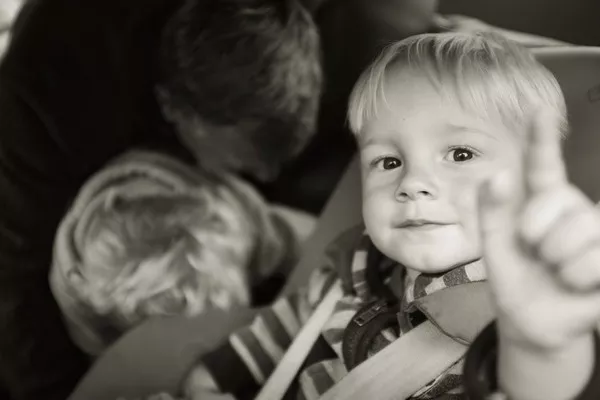Caring for a 6-week-old infant can be both rewarding and challenging, especially when they fall ill. One common concern for parents is dealing with an infant cold. At this tender age, babies are more susceptible to respiratory infections, and knowing how to navigate through this challenging time is crucial. In this comprehensive guide, we will explore the causes of infant colds and provide detailed mitigation measures to ensure the well-being of your 6-week-old.
Understanding the Causes
Infants, particularly those under two months old, have an underdeveloped immune system, making them vulnerable to various infections, including the common cold. The most common culprit is the rhinovirus, but other viruses such as respiratory syncytial virus (RSV) and human metapneumovirus can also lead to cold symptoms.
Viral Transmission: The primary mode of transmission for infant colds is through respiratory droplets. This can occur when an infected person coughs or sneezes, releasing tiny virus-containing droplets into the air. Infants are at risk of inhaling these droplets or coming into contact with contaminated surfaces.
Close Contact: Given the intimate nature of caregiving, close contact between an infected caregiver or family member and the infant increases the likelihood of transmission. Good hygiene practices are essential to minimize this risk.
Poor Ventilation: Stuffy environments with poor ventilation can contribute to the spread of viruses. Ensuring proper airflow in your home can help reduce the risk of infection.
Mitigation Measures
When faced with a 6-week-old infant with a cold, it’s essential to approach the situation with a combination of medical guidance and practical caregiving strategies. The following measures can help manage and alleviate the symptoms of an infant cold:
Seek Professional Guidance
a. Consult a Pediatrician: The first and most crucial step is to consult with a pediatrician. They will be able to assess the severity of the cold and provide personalized recommendations based on the infant’s health status.
b. Avoid Self-Medication: Never attempt to self-diagnose or administer over-the-counter medications without consulting a healthcare professional. Infants may react differently to medications, and incorrect dosages can be harmful.
Ensure Proper Hydration
a. Breastfeeding or Formula Feeding: Continue breastfeeding or formula feeding as usual. The hydration provided by breast milk or formula is crucial for an infant’s recovery.
b. Offer Small, Frequent Feedings: If the infant is reluctant to feed due to nasal congestion, offering smaller and more frequent feedings may be helpful. Ensure proper burping after each feeding.
Maintain Optimal Humidity
a. Use a Humidifier: A cool-mist humidifier in the baby’s room can help relieve nasal congestion and ease breathing difficulties. Ensure the humidifier is kept clean to prevent mold growth.
b. Saline Nasal Drops: Pediatrician-approved saline drops can be used to alleviate nasal congestion. A few drops in each nostril can help thin mucus, making it easier for the baby to breathe.
Promote Comfortable Sleep
a. Elevate the Head: Elevating the head of the crib slightly can help with nasal drainage and make breathing more comfortable for the infant. Use a rolled-up towel under the mattress for a gentle incline.
b. Comfortable Sleepwear: Dress the baby in comfortable, breathable layers to regulate body temperature. Avoid overdressing to prevent overheating.
Practice Good Hygiene
a. Frequent Handwashing: Ensure that everyone who handles the infant washes their hands thoroughly before touching the baby. This simple practice can significantly reduce the risk of viral transmission.
b. Use Tissues and Dispose Properly: Encourage the use of tissues when coughing or sneezing and dispose of them in a closed bin immediately. Regularly sanitize surfaces that may come into contact with respiratory droplets.
See Also:Managing a 10-Month-Old’s Cold: Expert Guidance
Limit Exposure to Environmental Irritants
a. Tobacco Smoke: Avoid exposing the infant to tobacco smoke, as it can exacerbate respiratory symptoms. If caregivers smoke, they should do so outside and change into clean clothes before handling the baby.
b. Pet Dander and Allergens: Minimize exposure to potential allergens and pet dander, as these can worsen respiratory symptoms. Keep the baby’s living environment clean and well-ventilated.
Conclusion
Dealing with an infant cold requires a combination of medical expertise and practical caregiving strategies. By understanding the causes of infant colds and implementing appropriate mitigation measures, parents can provide the best possible care for their 6-week-old. Always consult with a pediatrician for personalized advice, and remember that a calm and supportive environment is essential for both the infant’s recovery and the well-being of the entire family.
Related Topics:
What to Do if 7 Month Old Has a Cold?
Navigating Care for Your 8-Month-Old
How To Manage Cold Symptoms in 2-Month-Old Infants?


